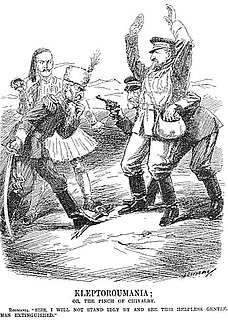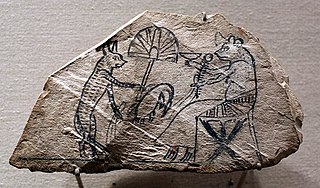 W
WSatire is a genre of literature and performing arts, usually fiction and less frequently in non-fiction, in which vices, follies, abuses and shortcomings are held up to ridicule, ideally with the intent of shaming individuals, corporations, government, or society itself into improvement. Although satire is usually meant to be humorous, its greater purpose is often constructive social criticism, using wit to draw attention to both particular and wider issues in society.
 W
WBrobdingnag is a fictional land, which is occupied by giants, in Jonathan Swift's 1726 satirical novel Gulliver's Travels. The story's main character, Lemuel Gulliver, visits the land after the ship on which he is travelling is blown off course. As a result, he becomes separated from a party exploring the unknown land. In the second preface to the book, Gulliver laments that the publisher misspelled the land's name, which Gulliver asserts is actually called Brobdingrag.
 W
WA burlesque is a literary, dramatic or musical work intended to cause laughter by caricaturing the manner or spirit of serious works, or by ludicrous treatment of their subjects. The word derives from the Italian burlesco, which, in turn, is derived from the Italian burla – a joke, ridicule or mockery.
 W
WCraposyncrasies or Doozakhrafat is a book by Sorush Pakzad of satirical pieces in Persian, which were posted on his personal blog before publication. The book includes 107 stories about gods, prophets, and angels and was published in February 2012 by H&S Media. The publisher included the book among its top-sellers in 2014.
 W
WNewspeak is the fictional language of Oceania, a totalitarian superstate that is the setting of dystopian novel Nineteen Eighty-Four, by George Orwell. In the novel, the ruling English Socialist Party (Ingsoc) created Newspeak to meet the ideological requirements of English Socialism in Oceania. Newspeak is a controlled language of simplified grammar and restricted vocabulary designed to limit the individual's ability to think and articulate "subversive" concepts such as personal identity, self-expression and free will. Such concepts are criminalized as thoughtcrime since they contradict the prevailing Ingsoc orthodoxy.
 W
WAn extravaganza is a literary or musical work characterized by freedom of style and structure and usually containing elements of burlesque, pantomime, music hall and parody. It sometimes also has elements of cabaret, circus, revue, variety, vaudeville and mime. Extravaganza may more broadly refer to an elaborate, spectacular, and expensive theatrical production.
 W
WThe Fake Show is a talk show and news satire program covers the biggest news stories in Iraq and the Arab World. In politics, pop culture and more. Hosted by Sami Quinn, an alien in human form. The show first premiered on October 25, 2019 on YouTube, inspired by American television programs like The Daily Show, Last Week Tonight, and The Opposition with Jordan Klepper. The fake show is the first satire show in Arabic language that breaks every taboo and makes fun-uniquely, even of the clerical establishment and its icons in a straightforward fashion. Comedy, It's no laughing matter. Especially when it attempts to drive humor from the political process in Iraq or the Arab world, that's why The Fake Show plays with self-referential humor, black comedy, and dark sarcasm, by shaping serious-delicate issues like ISIS, racism, Iran-backed militias, assassinations, women's rights, and human rights violation in a form of humor that makes you catch the differences between political satire, comedy itself, and the regular daily news. The main message focuses on major goals such as fighting for free speech and exposing the political corruption in the Arab world and the political parties in Iraq after the 2003 invasion, by making half-half funny-serious segments of people trying to hide their actions behind a fake cloud of holiness, either under a religious excuse, family historical-sacred titles, or their own political and military history.
 W
WJonah or Jonas Ben-Amittai is a prophet in the Hebrew Bible from Gath-hepher of the northern kingdom of Israel in about the 8th century BCE. He is the central figure of the Book of Jonah, in which he is called upon by God to travel to Nineveh and warn its residents of impending divine wrath. Instead, Jonah boards a ship to Tarshish. Caught in a storm, he orders the ship's crew to cast him overboard, whereupon he is swallowed by a giant fish. Three days later, after Jonah agrees to go to Nineveh, the fish vomits him out onto the shore. Jonah successfully convinces the entire city of Nineveh to repent, but waits outside the city in expectation of its destruction. God shields Jonah from the sun with a plant, but later sends a worm to cause it to wither. When Jonah complains of the bitter heat, God rebukes him.
 W
WNewspeak is the fictional language of Oceania, a totalitarian superstate that is the setting of dystopian novel Nineteen Eighty-Four, by George Orwell. In the novel, the ruling English Socialist Party (Ingsoc) created Newspeak to meet the ideological requirements of English Socialism in Oceania. Newspeak is a controlled language of simplified grammar and restricted vocabulary designed to limit the individual's ability to think and articulate "subversive" concepts such as personal identity, self-expression and free will. Such concepts are criminalized as thoughtcrime since they contradict the prevailing Ingsoc orthodoxy.
 W
WNPC, derived from Non-Player Character in video games and from role playing games such as Dungeons & Dragons, is an Internet meme that represents people who do not think for themselves or do not make their own decisions; it is also known as NPC Wojak. The NPC meme, which graphically is based on the Wojak meme, was created in July 2016 by an anonymous author and first published on the imageboard 4chan, where the idea and inspiration behind the meme were introduced.
 W
WOur Lady of Perpetual Exemption was a legally recognized church in the United States, established by comedian and satirist John Oliver. Its purpose was to expose and ridicule televangelists such as Robert Tilton and Creflo Dollar who preach the "prosperity gospel", seen as a way to defraud believers of their money, and to draw attention to the tax-exempt status given to churches and charities with little government oversight. Oliver announced formation of his church on August 16, 2015, in a twenty-minute segment on his show Last Week Tonight.
 W
WA pasquinade or pasquil is a form of satire, usually an anonymous brief lampoon in verse or prose, and can also be seen as a form of literary caricature. The genre became popular in early modern Europe, in the 16th century, though the term had been used at least as early as the 15th century. Pasquinades can take a number of literary forms, including song, epigram, and satire. Compared with other kinds of satire, the pasquinade tends to be less didactic and more aggressive, and is more often critical of specific persons or groups.
 W
WPolitical satire is satire that specializes in gaining entertainment from politics; it has also been used with subversive intent where political speech and dissent are forbidden by a regime, as a method of advancing political arguments where such arguments are expressly forbidden.
 W
WThe pun, also known as paronomasia, is a form of word play that exploits multiple meanings of a term, or of similar-sounding words, for an intended humorous or rhetorical effect. These ambiguities can arise from the intentional use of homophonic, homographic, metonymic, or figurative language. A pun differs from a malapropism in that a malapropism is an incorrect variation on a correct expression, while a pun involves expressions with multiple interpretations. Puns may be regarded as in-jokes or idiomatic constructions, especially as their usage and meaning are usually specific to a particular language or its culture.
 W
WSatirical ostraca are a category of ostraca that represent the real world in unrealistic, impossible situations–a satire. The common example portrayed which helped create this categorization, are animals which take reversed roles, for example a vertically–walking cat, with ducks on the end of leashes. The same role reversals can be seen on satirical papyri. This concept is a prevalent feature in absurdist literature, such as in the works of Mikhail Bulgakov.
 W
WTrickle-down economics, also known as trickle-down theory or the horse and sparrow theory, is the economic proposition that taxes on businesses and the wealthy in society should be reduced as a means to stimulate business investment in the short term and benefit society at large in the long term. In recent history, the term has been used by critics of supply-side economic policies, such as "Reaganomics". Whereas general supply-side theory favors lowering taxes overall, trickle-down theory more specifically targets taxes on the upper end of the economic spectrum. Empirical evidence shows that the proposition has never managed to achieve its stated goals.
 W
WVictorian burlesque, sometimes known as travesty or extravaganza, is a genre of theatrical entertainment that was popular in Victorian England and in the New York theatre of the mid-19th century. It is a form of parody in which a well-known opera or piece of classical theatre or ballet is adapted into a broad comic play, usually a musical play, usually risqué in style, mocking the theatrical and musical conventions and styles of the original work, and often quoting or pastiching text or music from the original work. Victorian burlesque is one of several forms of burlesque.